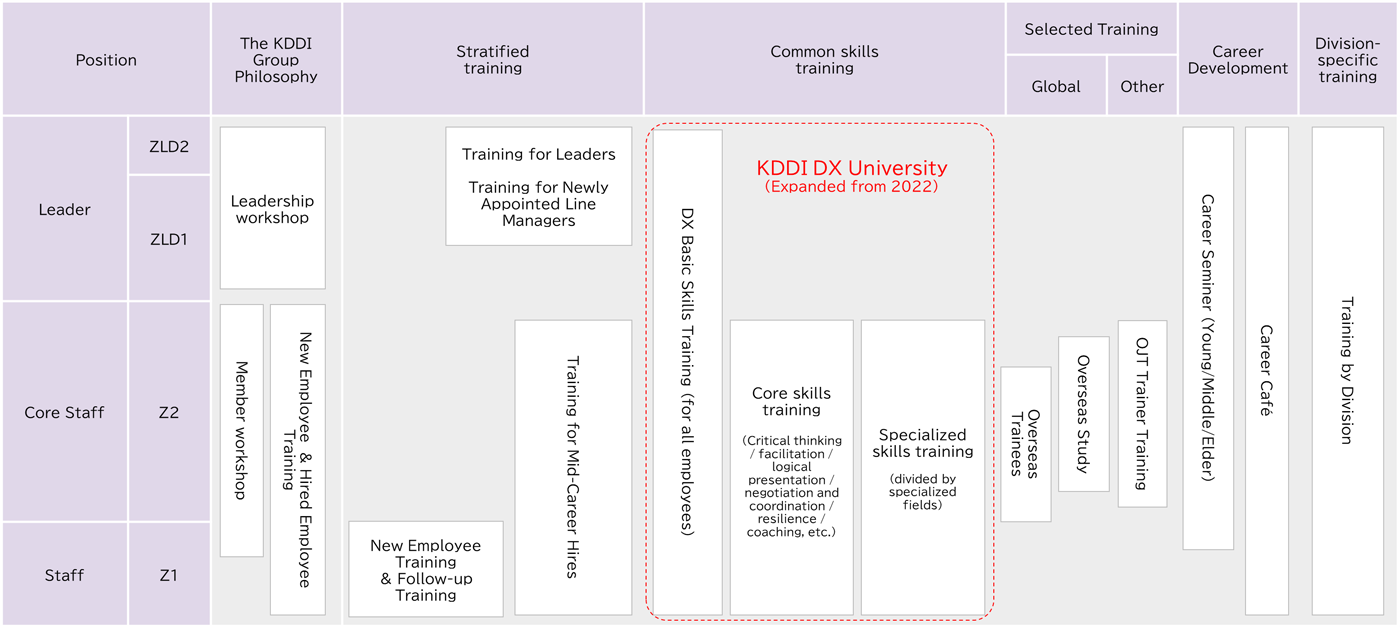- KDDI HOME
 Corporate Information
Corporate Information  Sustainability
Sustainability  Human Resources
Human Resources
Human Resources
KDDI's Approach (Recruiting and Developing Human Resources)
As the working-age population continues to decrease due to the declining birthrate and aging population in Japan, it is said that the country's economic growth will slow down. The market environment of the information communication sector has been changing rapidly and drastically in recent years as we have been experiencing technological innovation, intensified competition on a global scale and the participation of a variety of carriers. To respond to these changes and continue growing in a timely manner, we need to recruit diverse talents regardless of nationality, gender, age or (dis) ability and promote their advancement.
In accordance with the "Satellite Growth Strategy," KDDI regards the recruitment and development of human resources that can play an active role in the 5G-driven evolution of the telecommunications business and focus areas with telecommunications at the core, and the raising of the potential of the company's workforce as the highest priority.
Human Resource Cultivation Management
In the recruitment stage, we have removed the gender query from the application sheet in 2016 to ensure we hire diverse talents.
We execute various measures for effective employee growth, including on-the job training (OJT) and off-the-job training (OFF-JT). Additionally, we create a drive to grow in employees by providing each with proper evaluations and feedback. We have also prepared various programs for those employees passionate about growing themselves and leading changes that encourage them to work on actively cultivating their potential instead of staying passive.
Also, we support the acquisition of company-designated qualifications by paying examination fees and other related expenses.
KDDI Human Resource Cultivation Measures
| Program | Content |
|---|---|
| Executive assistant | Taking on a position that supports directors and other executives, and directly learning the management mindset up close. |
| Job rotation system | The program is designed to help younger employees think deeply about their career plans for the future they want, and expand the range of experience and take other actions to achieve their personal growth (career development and transfer). |
| Internal recruitment system | The program is designed to support employees in their autonomous career development by creating opportunities for motivated employees to take up the challenge of working in a business area that needs a boost or in a position of a Line Manager (the program also covers the promotion of work to be undertaken by elders). |
| KDDI intra-group sideline working system | Along with the job rotation system and open recruitment system, a system that provides opportunities for practice that differs from the regular work, up to 20% of work hours, with the aim to support their self-sustained career development. |
| Career plan reporting system | Employees can consult with their superior on their future career plans based on the reports about their career history and current situation. |
| Stratified training | Employees acquire the knowledge and skills needed for carrying out their work depending on the position or qualifications they have. |
| Lifelong learning sabbatical program | Employees wishing to study toward a qualification or acquire new skills on a voluntary basis can take a career break of up to three years. |
| Study abroad | Enrolled in overseas universities or specialized institutions to acquire advanced expertise and foster the deepening of personal networks through interactions with business professionals. |
| Overseas trainee system | Employees wishing to join the program are sent to an overseas base for a certain period of time and, by conducting business, they learn how to carry out their work in a professional manner no matter the values and business customs of those who surround them. |
| Global employee exchange program | In this program, employees hired overseas are invited to our headquarters in Japan to learn about the business customs, operations and philosophy of the KDDI Group and strengthen their partnerships with foreign customers who have offices in Japan. |
| KDDI DX University (KDU) | A training program system that facilitates the development and expansion of professional human resources in KDDI's core business, including the DX business and various other specialized fields. |
| 【KDU】Specialized skills training | Training tailored to the acquisition of specialized skills in each skill domain based on job and skill definitions in all 30 specialized fields, aimed at individuals who seek to specialize. |
| 【KDU】DX Basic skills training | A mandatory training for all employees to acquire DX basic skills that serve as the basis executing the Satellite Growth Strategy. |
| Core skills training | Training for those who wish to enhance the business skills and interpersonal capabilities necessary for all employees based on the "Core Skill Assessment" in the KDDI Version Job Style Personnel System. |
Training System by Position

For executives and general managers, we organize study sessions on the KDDI Group Philosophy and Sustainability Management.
Grading System and Specialized Fields
KDDI has established "grades" categorized based on the differences in the size of job roles and the expected human resource requirements.
Among these, managerial positions (referred to as personnel in managerial positions) are divided into leadership and professional tracks.
The roles and human resource requirements expected at each grade are defined in the grade definition document, and these serve as benchmarks for career development, target setting, performance evaluation, and grade appointments, among other system criteria.
In the KDDI Version Job Style Personnel System, we position "specialized fields" as units of expertise for each KDDI employee to excel as professionals. For each specialized field, we have defined a specialized field document that further specifies the grade definitions. Alongside the actual job descriptions, employees can understand the roles, abilities, and degree of specialization required individually.
Evaluation and Remuneration Systems
KDDI aims to achieve fair and transparent personnel evaluation and compensation by eliminating evaluations based on job functions and years of service. Instead, the focus is on assessing achievement, with an emphasis on challenging actions to enhance performance, problem-solving skills, communication abilities, and expertise. Additionally, each employee engages in one-on-one sessions with their supervisors, focusing on both "people" and "work" to maximize individual achievements and personal development. These sessions cover various topics such as building trust, job success, career development, support for learning, and realizing one's goals and vision.
We refer to the conventional goal management system as "Achievement and Challenge Evaluation." In this system, we evaluate not only job outcomes but also the challenging actions taken to enhance those outcomes. At the beginning of each period, tasks and objectives are set in line with the roles expected for each grade, and throughout the period, regular one-on-one meetings are held while making necessary course corrections. At the end of the period, a review is conducted in a face-to-face meeting format with the supervisor, reflecting on the interactions and progress accumulated during the initial and mid-term one-on-one sessions. After reaching a consensus with not only the immediate supervisor but also others, a final decision is made (regarding the Achievement and Challenge Evaluation). This evaluation is conducted twice a year and includes all employees.
The abilities to solve problems, communicate, and demonstrate expertise are assessed through 360-degree evaluations and supervisor assessments as part of the performance evaluation. Abilities to solve problems and communication skills are assessed for each grade based on expected behavioral traits, using a 360-degree feedback and comparison with market standards (core skill assessment). Expertise is evaluated through supervisor assessments, based on the knowledge, skills, and experience demonstrated in specific job performance within the relevant domain (technical skill assessment). Abilities to solve problems and communication skills are assessed for each grade based on expected behavioral traits, using a 360-degree feedback and comparison with market standards (core skill assessment). Expertise is evaluated through supervisor assessments, based on the knowledge, skills, and experience demonstrated in specific job performance within the relevant domain (technical skill assessment). This performance evaluation (core skill assessment and technical skill assessment) is conducted annually for all employees.
By plotting the results of "Achievement and Challenge Evaluation" and "Competency Assessment" on a matrix, we visualize the current position of each employee (i.e., human resource reviews) and utilize it for career development and reward reflection that leverages their strengths. This human resource review is conducted annually for employees who are not subject to grade-based promotions or salary increases.
As for bonuses, there are two types: corporate performance bonuses that reflect the company's performance and individual performance bonuses that reflect the personal business performance of each employee.
Employee Engagement Survey
KDDI conducts the quarterly Employee Engagement Survey because we believe that if each employee feels motivated and enjoys working, we will continue to grow.
This survey measures employee engagement as KDDI defines, namely each employee's level of "voluntary contribution and motivation toward the company and their work," to make the results into indicators.
The results of the survey are shared real-time with leaders of each organization.
Human Resources Department does not analyze the results of the Employee Engagement Survey or formulate measures using the results.
The leader of each organization will share the results with their respective members and discuss what actions to take for them to work feeling motivated and fulfilled. We believe that this process itself will improve the level of the employee engagement.
We are committed to improving the employee engagement by working on this activity company-wide.
Providing Mid- and Long-Term Incentives for Employees
KDDI has adopted a stock ownership association system (KDDI Employee Stock Ownership Association) as a mid- to long-term incentive for its employees.
The KDDI Employee Stock Ownership Association was established as part of an employee welfare program. Employees, including those from KDDI Group companies, can voluntarily join the Association and contribute a specific amount from their monthly salaries and bonuses. This, combined with incentive payments from KDDI, allows them to purchase KDDI shares each month without incurring undue costs, thereby assisting in the gradual building of their assets over the medium to long term.
Special Award from President
We have implemented award programs for employees to increase motivation and a sense of solidarity.
President's Award Results
| Award name | Number of awarded cases |
|---|---|
| President's Award | 3 |
| Contribution Award | 1 |
| Best Award Best Sales Category | 3 |
| Best Award Best Engineer Category (Individual Award) Category | 1 |
| Best Award Best Customer Support Category (Individual Award) | 2 |
(Evaluation period: April 1, 2022-March 31, 2023)
- Sustainability
-
- Environment
- Society
- Governance
- Mid-Term Sustainability Targets
- President's Message
- KDDI's Commitment to Sustainability
- KDDI's SDGs
- Integrated Sustainability and Financial Report
- ESG data
- Compliance
- Community Cooperation (in Japanese only)
- Social Contribution Activities
- Sustainability News (in Japanese only)
- External Recognition/Initiatives
- Recommended Contents
-


